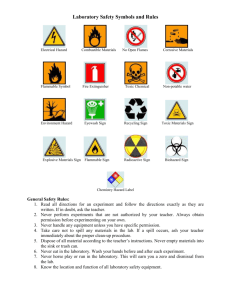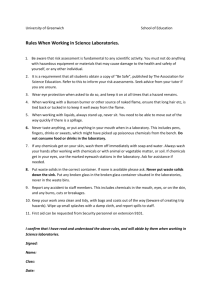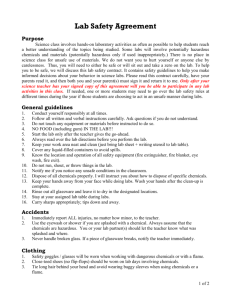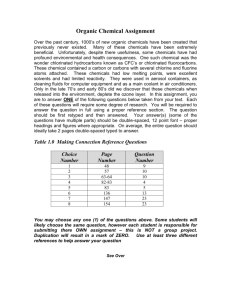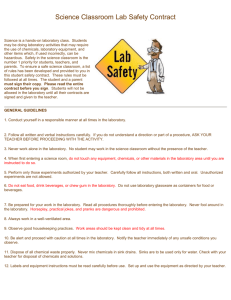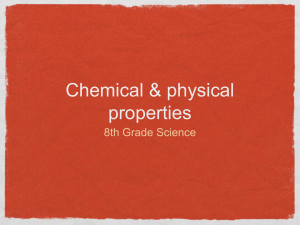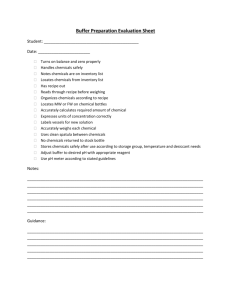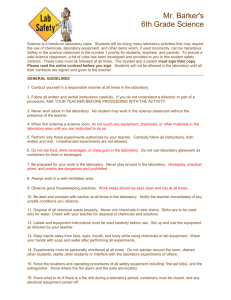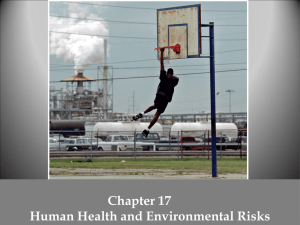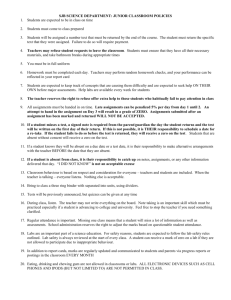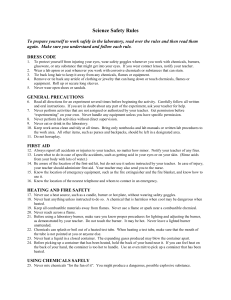2015-2016 Syllabus & Lab Safety
advertisement
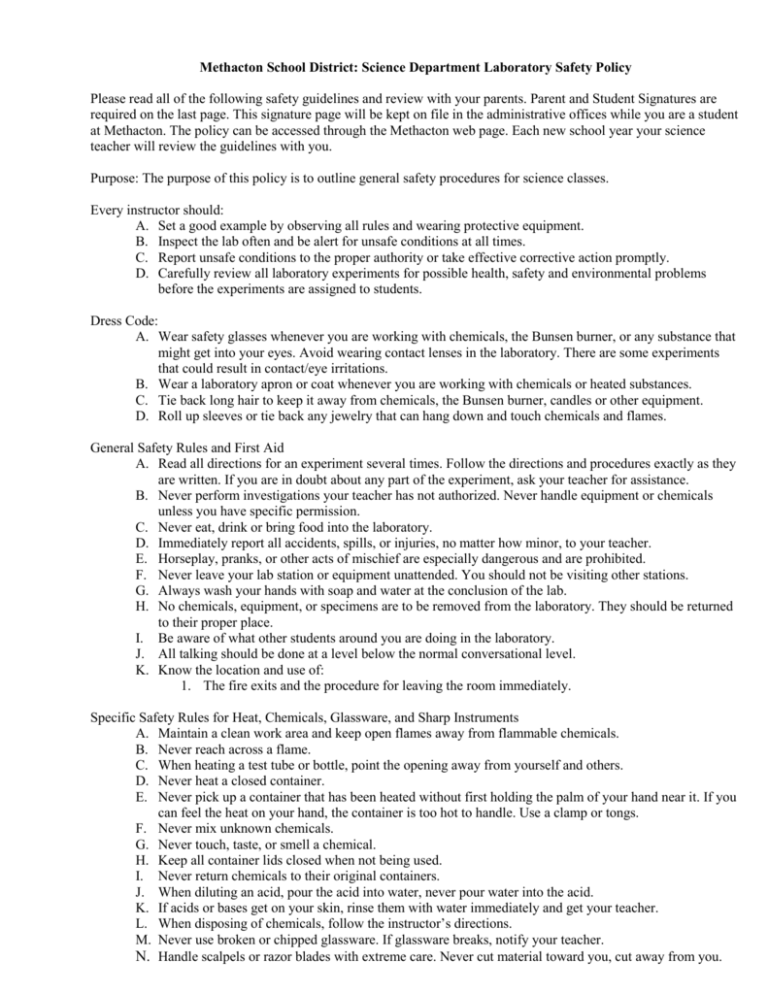
Methacton School District: Science Department Laboratory Safety Policy Please read all of the following safety guidelines and review with your parents. Parent and Student Signatures are required on the last page. This signature page will be kept on file in the administrative offices while you are a student at Methacton. The policy can be accessed through the Methacton web page. Each new school year your science teacher will review the guidelines with you. Purpose: The purpose of this policy is to outline general safety procedures for science classes. Every instructor should: A. Set a good example by observing all rules and wearing protective equipment. B. Inspect the lab often and be alert for unsafe conditions at all times. C. Report unsafe conditions to the proper authority or take effective corrective action promptly. D. Carefully review all laboratory experiments for possible health, safety and environmental problems before the experiments are assigned to students. Dress Code: A. Wear safety glasses whenever you are working with chemicals, the Bunsen burner, or any substance that might get into your eyes. Avoid wearing contact lenses in the laboratory. There are some experiments that could result in contact/eye irritations. B. Wear a laboratory apron or coat whenever you are working with chemicals or heated substances. C. Tie back long hair to keep it away from chemicals, the Bunsen burner, candles or other equipment. D. Roll up sleeves or tie back any jewelry that can hang down and touch chemicals and flames. General Safety Rules and First Aid A. Read all directions for an experiment several times. Follow the directions and procedures exactly as they are written. If you are in doubt about any part of the experiment, ask your teacher for assistance. B. Never perform investigations your teacher has not authorized. Never handle equipment or chemicals unless you have specific permission. C. Never eat, drink or bring food into the laboratory. D. Immediately report all accidents, spills, or injuries, no matter how minor, to your teacher. E. Horseplay, pranks, or other acts of mischief are especially dangerous and are prohibited. F. Never leave your lab station or equipment unattended. You should not be visiting other stations. G. Always wash your hands with soap and water at the conclusion of the lab. H. No chemicals, equipment, or specimens are to be removed from the laboratory. They should be returned to their proper place. I. Be aware of what other students around you are doing in the laboratory. J. All talking should be done at a level below the normal conversational level. K. Know the location and use of: 1. The fire exits and the procedure for leaving the room immediately. Specific Safety Rules for Heat, Chemicals, Glassware, and Sharp Instruments A. Maintain a clean work area and keep open flames away from flammable chemicals. B. Never reach across a flame. C. When heating a test tube or bottle, point the opening away from yourself and others. D. Never heat a closed container. E. Never pick up a container that has been heated without first holding the palm of your hand near it. If you can feel the heat on your hand, the container is too hot to handle. Use a clamp or tongs. F. Never mix unknown chemicals. G. Never touch, taste, or smell a chemical. H. Keep all container lids closed when not being used. I. Never return chemicals to their original containers. J. When diluting an acid, pour the acid into water, never pour water into the acid. K. If acids or bases get on your skin, rinse them with water immediately and get your teacher. L. When disposing of chemicals, follow the instructor’s directions. M. Never use broken or chipped glassware. If glassware breaks, notify your teacher. N. Handle scalpels or razor blades with extreme care. Never cut material toward you, cut away from you. Classroom Rules and Procedures for Science Welcome to my Science Class! I am excited to be your teacher this year and am looking forward to helping you learn all about the science of life. For the greatest amount of learning to occur for everyone, please follow these five simple rules: 1. 2. 3. 4. 5. Be Respectful Be Prepared Do What You Are Supposed To Do Work to the Best of Your Ability Get Involved Below I will expand upon each rule and give you my expectations and outline some consequences if you choose not to follow the rules: 1. Be Respectful – Be kind to your classmates, your teacher, and yourself. No bullying will be tolerated. Make sure you practice the classroom manners that you have learned, such as raising your hand and not speaking or munching on food during formal instruction. 2. Be Prepared –Come into class ready to learn. This means do your homework and have it easily accessible when you enter class, as well as your openers and assignment books. Study for tests, always bring pencils, pens, and paper. Dress appropriately so you can participate in labs and class. 3. Do What You Are Supposed to Do – Follow the rules on this page, also make sure you follow the attached Methacton School District Laboratory Safety Policy when in labs. I will further explain my policies on some common issues: a. Student Work – Nightly homework will not be accepted late; it must be present when I check for it. Late openers, labs, and assignments greater than 10 points will be accepted late for one week after the due date with a 20% penalty each day late. Anyone involved in plagiarism/ cheating/ copying will receive a zero. b. Absentee Policy- If you are absent, it is your responsibility to find out what you missed and complete it in a timely manner. Check the appropriate place in class and online for missed work. Missed tests and quizzes should be completed within a week of the original testing date. Please see me if you have any questions. c. Personal Technology – Cell phones, MP3 players, cameras, and other personal technologic devices are not permitted in classrooms. I understand that everyone has them and sometimes they go off by accident, but to maximize learning, we need to keep distractions to a minimum. Any devices should be kept on silent in a pocket or a bag and should remain there for the remainder of class unless I say otherwise. For a first offence, you will receive a warning. For a second offense, I will contact home and confiscate the device for the remainder of class. Any further offenses will result in an after school detention, then administrative action. d. Food and Drink –Little snacks are fine. Make sure that it is not disrupting the class. If food becomes a distraction such as passing it during class or if it is too loud, it may be banned from the classroom altogether. There is absolutely no food or drink allowed during labs. e. Restroom- Remember you are in class to learn! Please make sure if you need to go to the restroom, you do it in the beginning of the class. You must sign out and bring the pass with you. If you do not put your homework on your desk before you go, it will be a zero. You may also go to the restroom at the end of class if we are finished with the lesson. DO NOT RAISE YOUR HAND IN THE MIDDLE OF THE CLASS TO ASK TO GO TO THE BATHROOM! This is very distracting to the class. f. Lab Safety – You must follow all lab safety procedures. A minor offense will receive a warning; repeat and major offenses will result in a zero for the lab and possible administrative action. 4. Work to the Best of Your Ability – Not everyone is expected to be a brain surgeon, but you are expected to put forth enough effort to do your homework most of the time and study for your tests. Take advantage of extra credit opportunities. If you ever need help, please see me at the end of the school day Tuesday, Wednesday, and/ or Thursday. Remember you are the only one who can impact your grade. It is a reflection of you, make it a good one! 5. Get Involved – Class is much more enjoyable when everyone participates. Biology is a fascinating subject and the information that you are learning is always changing. I hope I can learn a lot from you as well, make sure you share any current events that you hear that pertain to what we are learning! ENVIRONMENTAL SCIENCE CURRICULUM 2015 - 2016 Welcome to Environmental Science and the high school! This year you will study many aspects of the natural world. Environmental Science is defined as: the branch of science concerned with the physical, chemical, and biological conditions of the environment and their effect on organisms. 1st Marking Period 1. Science Skills Using a balance and reading glassware Observations versus inferences Quantitative versus Qualitative The Scientific Method Graphing skills o Know when to use a Bar, Line, Pie graph. o Know the major features of a graph. (Title, Scale, Units…) Metric review, Density and Temperature o Know the formula for density and how to calculate this property of matter. o Given formulas for temperature, be able to convert between Fahrenheit, Celsius and Kelvin. 2. Taxonomy and Ecosystems Be able to name animals using Linnaeus’s Binomial Nomenclature system. Know and explain the three Domains of nature. Be able to use Dichotomous keys. Be able to use Cladograms. Be able to define similarities and differences between the world’s biomes. Define the difference between Niches and Habitats. Explain what Trophic levels are and how the 10% rule applies. Make and design Food webs and food chains. Explain animal relationships such as Symbiosis. Explain changes in population that are both natural and manmade. 2nd Marking Period 3. Wetlands and Watersheds How is water distributed on Earth? The water cycle o Clearly define and explain the difference between infiltration and runoff. pH scale o Define differences between acids and bases. Characteristics of fresh water and related vocabulary PA watersheds Macro invertebrate in freshwater Wetland types and their characteristics o swamps, marshes and bogs 4. Resources and Electricity Define the difference between renewable and nonrenewable resources. List the major sources of power and electricity in the US and in PA Electricity and Generation o Explain how electricity is generated. Read a PA power bill Explain how people can conserve energy and electricity in the home and during generation. 3rd Marking Period 5. Resources continued Non renewable o Coal, Nuclear and Natural Gas o Marcellus shale/ fracking Renewable o Solar, wind, hydroelectric 6. Air, Atmosphere, Environmental Health Air and layers/ features of the Atmosphere Human causes of Global warming Carbon Cycle Pollution o Point and non-point source pollution Major water diseases o Typhoid, Dysentery, Malaria, Cholera Eutrophication and its impacts on freshwater Sewers and septic tanks How can communities work to fix water pollution 4th Marking Period 7. Trash/ Landfills/Recycling Be able to explain how trash is dealt with in your area and where it goes. Reduce, reuse, Recycle! 8. Agriculture IPM Organics, buying local movement, benefits and drawbacks of labeling GMO’s. Crop rotations Monocultures Invasive species Nitrogen cycle 9. Review of Ecosystems Very important since it will be on the Keystones. This is the only thing from the first semester that will be on the Final exam. Please fill in the following information and return by __________________________________________. 1. Name: ___________________________________________________________ 2. Address: ____________________________________________________________________________ Phone Number:______ - _________ - ____________ Your e-mail: ________________________________ 3. Do you have the internet at home? YES / NO Do you have a computer at home? YES / NO 4. How many people are in your family? Tell me about them. ____________________________________ ______________________________________________________________________________________ ______________________________________________________________________________________ 5. What are you really good at? ____________________________________________________________ 6. What academic class do you like best?_____________________________________________________ 7. What school did you go to last year? ______________________________________________________ 8. Who was your science teacher? __________________________________________________________ 9. What did you do this summer? ___________________________________________________________ 10. What is something you want to learn this year? ____________________________________________ ______________________________________________________________________________________ 11. Tell me two more things about you. 1. ____________________________________________________________________________________ 2. ____________________________________________________________________________________ Please sign below to verify that you, the student, and you, the parent, have read and understand the Methacton School District Laboratory Safety Policy, Classroom Rules and Procedures for Science and Environmental Science Curriculum. Parent Name (Print) Parent Name (Signature) Student Name (Print) Student Name (Signature)

